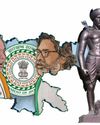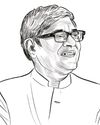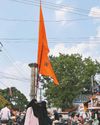Ayodhya could well lay the foundations of a society based on ‘liberty, equality and fraternity’. How close to emancipation are our national mind and soul?

HINDU is not a religious group, nor is Hinduism a religion in the strict sense of the term. But the adoption of the Westphalian model of democracy has necessitated the discourse on secularism versus communalism and the role of religion in politics in a society where all these ideas were alien until about a century ago. The issue of the oft-repeated promise of the construction of a Ram temple in Ayodhya has come to dominate political discourse once again, eclipsing all other issues that featured prominently on social media since 2014. Blame it on the impending 2019 Lok Sabha elections or the very nature of being Indian.
During the run-up to the demolition of the dilapidated structure in Ayodhya, popularly referred to as Babri Masjid, on December 6, 1992, it was primarily the question of what represents Hindu awareness, Hindu rights and Hindu interests that was prominently raised. The fragmentation of Hindu votes was seen as a prime reason for the lack of political authority commensurate with the strength of the Hindu population. The Ayodhya movement brought about a monumental change in Hindu society, albeit temporarily, making it rise above the barriers of caste and language. Since those at the forefront of the movement belonged to the BJP, which had started with just two members in the Lok Sabha, Hindu consolidation catapulted the party to one with significant numbers, and then its leader to the position of prime minister.
This story is from the {{IssueName}} edition of {{MagazineName}}.
Start your 7-day Magzter GOLD free trial to access thousands of curated premium stories, and 9,000+ magazines and newspapers.
Already a subscriber ? Sign In
This story is from the {{IssueName}} edition of {{MagazineName}}.
Start your 7-day Magzter GOLD free trial to access thousands of curated premium stories, and 9,000+ magazines and newspapers.
Already a subscriber? Sign In

Trump's White House 'Waapsi'
Donald Trump's victory in the US presidential election may very well mean an end to democracy in the near future

IMT Ghaziabad hosted its Annual Convocation Ceremony for the Class of 2024
Shri Suresh Narayanan, Chairman Managing Director of Nestlé India Limited, congratulated and motivated graduates at IMT Ghaziabad's Convocation 2024

Identity and 'Infiltrators'
The Jharkhand Assembly election has emerged as a high-stakes political contest, with the battle for power intensifying between key players in the state.

Beyond Deadlines
Bibek Debroy could engage with even those who were not aligned with his politics or economics

Portraying Absence
Exhibits at a group art show in Kolkata examine existence in the absence

Of Rivers, Jungles and Mountains
In Adivasi poetry, everything breathes, everything is alive and nothing is inferior to humans

Hemant Versus Himanta
Himanta Biswa Sarma brings his hate bandwagon to Jharkhand to rattle Hemant Soren’s tribal identity politics

A Smouldering Wasteland
As Jharkhand goes to the polls, people living in and around Jharia coalfield have just one request for the administration—a life free from smoke, fear and danger for their children

Search for a Narrative
By demanding a separate Sarna Code for the tribals, Hemant Soren has offered the larger issue of tribal identity before the voters

The Historic Bonhomie
While the BJP Is trying to invoke the trope of Bangladeshi infiltrators”, the ground reality paints a different picture pertaining to the historical significance of Muslim-Adivasi camaraderie